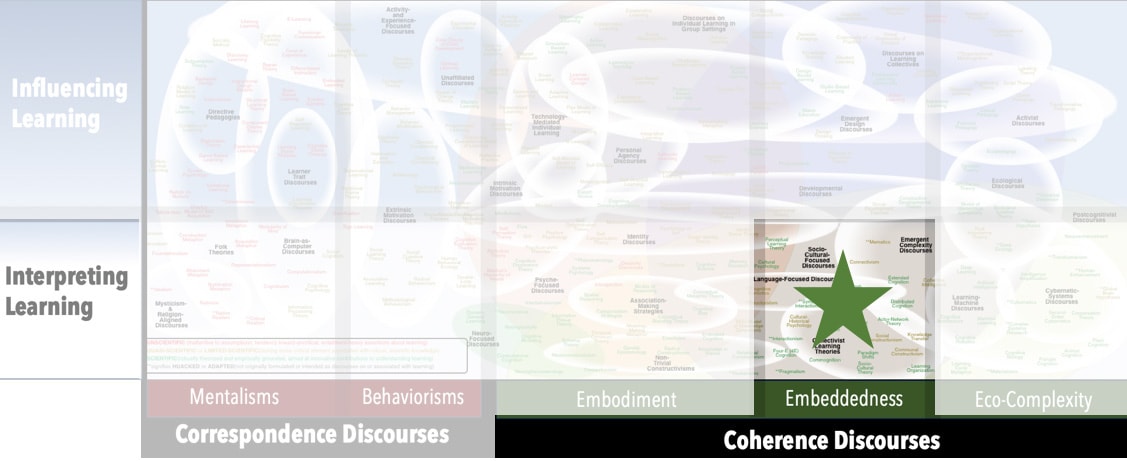Focus
Individual cognition, understood as an “activity system” (object-oriented, collective, socially situated, and culturally mediated human activity)Principal Metaphors
- Knowledge is … activity system
- Knowing is … acting (within an activity system)
- Learner is … an actor (individual)
- Learning is … adapting /fitting; expanding possibilities
- Teaching is … modeling, coaching
Originated
1930s / 1980sSynopsis
Activity Theory, which is rooted in Socio-Cultural Theory, is a perspective on learning and knowing that focuses on activity systems as a means to simultaneously consider the individual’s cognition and the social reality. It takes into account the knower’s history, motivations, mediating artefacts (language, tools, etc.), community, situation, and culture. More broadly, it looks at systems comprising multiple actors, such as teams and organizations, with particular given attention to rules and divisions of labor. Associated constructs include:- Activity System (Behavior System) (Sergei Rubinstein, 1930s) – the unit of analysis in Activity Theory (and Cultural-Historical Activity Theory), which includes an object/objective, community, and activity (governed by rules, and mediated by artifacts)
- Systemic-Structural Activity Theory (SSAT) (1990s) – a modern synthesis of Activity Theory with insights from Complex Systems Research, Cultural-Historical Activity Theory, Design Thinking, and recent developments in Psychology. SSAT is focused on the analysis and design of skills, tasks, tools, and strategies of work activity.
Commentary
Activity Theory was among the first systems-based theories of learning, and it contributed to significant movement in the field of education. However, since being proposed in the 1980s, some have come to see its focus on culturally embedded activity systems as narrow and limiting – especially in the face of significant ecological issues that fall outside the purview of the theory.Authors and/or Prominent Influences
Sergei Rubinstein; Lev Vygotsky; Alexei Leont’ev; Yrjö EngeströmStatus as a Theory of Learning
Activity Theory is a theory of learning.Status as a Theory of Teaching
Activity Theory is not a theory of teaching, and proponents are careful to highlight that it is mainly a descriptive theory rather than a predictive or prescriptive one. However, with its focus on activity systems, it offers some immediately useful advice on formatting activities and engaging learners in educational action.Status as a Scientific Theory
Activity Theory meets the requirements of a scientific theory. Indeed, its authors (especially Yrjö Engeström) have led the way on articulating criteria by which the scientific merits of learning theories might be assessed.Subdiscourses:
- Activity System (Behavior System)
- Systemic-Structural Activity Theory (SSAT)
Map Location

Please cite this article as:
Davis, B., & Francis, K. (2022). “Activity Theory” in Discourses on Learning in Education. https://learningdiscourses.com.
⇦ Back to Map
⇦ Back to List
